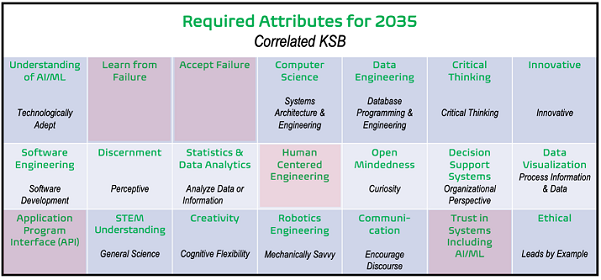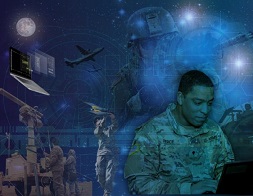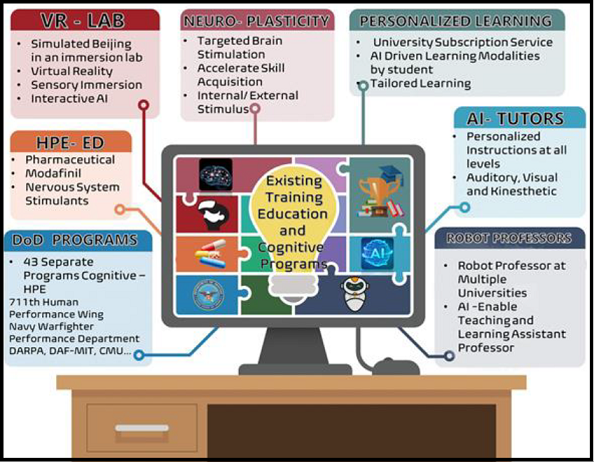[Editor’s Note: The Army’s Mad Scientist Laboratory is pleased to feature today’s post by the United States Army War College (USAWC) Team Techno-Warfare Group, excerpted from their final report entitled Techno Sentient Warfare in 2035. This report documents the findings from their group Strategic Research Requirement that occurred over eight months (from October 2022 to May 2023).
 The Team Techno-Warfare Group consisted of COL Leslie Carlson (USA), LTC Fidel Arvelo (USA), LTC Phillip Cain (USA), LTC Samuel Meyer (USA), and Col s Dorian Hatcher (USSF). Their requirement synthesized and analyzed open-source information and interviews with subject-matter experts to answer the following strategic question posed by the Deputy Chief of Staff, G-2, U.S. Army Training and Doctrine Command: What will Intelligentized warfare look like in 2035, and what skill sets will leaders need to win in this environment? Read on to learn what our most recently proclaimed Mad Scientists have to say about preparing our Leaders to fight and win in future conflicts!]
The Team Techno-Warfare Group consisted of COL Leslie Carlson (USA), LTC Fidel Arvelo (USA), LTC Phillip Cain (USA), LTC Samuel Meyer (USA), and Col s Dorian Hatcher (USSF). Their requirement synthesized and analyzed open-source information and interviews with subject-matter experts to answer the following strategic question posed by the Deputy Chief of Staff, G-2, U.S. Army Training and Doctrine Command: What will Intelligentized warfare look like in 2035, and what skill sets will leaders need to win in this environment? Read on to learn what our most recently proclaimed Mad Scientists have to say about preparing our Leaders to fight and win in future conflicts!]
The Army categorizes attributes into seven ‘talent domains,’ further broken down into 42 ‘talents,’ and finally into 199 measurable KSBs (Knowledge, Skills, and Behaviors). ‘Knowledge’ refers to facts and information that someone knows, ‘Skills’ refer to what someone can do, and ‘Behaviors’ refer to how someone acts. The Techno-Warfare Group’s research indicates it is almost certain (86-99%) leaders will need to cultivate some existing KSBs, learn new technologies, and develop new skills and behaviors for future warfare. During an interview, experts from Shield AI proposed that leaders must develop knowledge and skills that include cultivating a deep understanding of emerging technologies, mastering the intricacies of the artificial intelligence decision-making processes, and developing an advanced comprehension of big data-driven AI solutions. Understanding how AI is trained and how it makes decisions will be crucial for fostering trust in the systems we will rely on in the future.
The Techno-Warfare Group identified the attributes listed as necessary for conflict in 2035 (shown in green text, per figure below). Next, the team compared those attributes with the list of 199 KSBs identified in the Army Talent Attribute Framework (shown in black text). All terms could be correlated to an existing KSB except for the following (shown as red shaded fields): Learn from Failure; Accept Failure; Human Centered Engineering; Application Program Interface; and Trust in Systems including AI/ML.

Learn From and Accept failure: Failure is often a prerequisite to innovation or invention. IBM’s Thomas Watson, Sr., once said, “the fastest way to succeed is to double your failure rate.” The behavior associated with accepting failure and the skill associated with learning from failure will be critical in a Techno-sentient environment; it also lies counter to U.S. Army culture. In referring to regulations that essentially override junior leader decisions, Casey Haskins wrote an article titled A Good Answer to an Obsolete Question: The Army’s Culture and Why it Needs to Change, where she lamented “[the institutions] existed to prevent failure, and no one seemed to notice that in so doing they  also prevented excellence.” Innovation in a rapidly changing environment with new combinations of technologies will require trial and error, initiated from the bottom up, where eventual successful iterations can be shared seamlessly across the Force.
also prevented excellence.” Innovation in a rapidly changing environment with new combinations of technologies will require trial and error, initiated from the bottom up, where eventual successful iterations can be shared seamlessly across the Force.
Human Centered Engineering: In 2021 Boston College launched a human-centered engineering program that combines a liberal arts focus with a demanding engineering curriculum. The program uses design thinking at its  core and emphasizes experiential learning in collaborative teams across disciplines. As technology advances in an increasingly digitized and automated world, the U.S. military needs to consider more than just the technical aspects of technological improvements and should strive to promote and develop systems that recognize the importance of keeping humans at the intersection of technology and military applications – not just for ethical reasons, but for effectiveness as well.
core and emphasizes experiential learning in collaborative teams across disciplines. As technology advances in an increasingly digitized and automated world, the U.S. military needs to consider more than just the technical aspects of technological improvements and should strive to promote and develop systems that recognize the importance of keeping humans at the intersection of technology and military applications – not just for ethical reasons, but for effectiveness as well.
Application Program Interface: One of the themes identified throughout Team Techno-Warfare Group’s research is the need for interdisciplinary solutions to facilitate converging technology applications. Application Program Interface (API) skills are essential for modern and future software development because it allows developers to build complex systems through leveraging the functionality of other applications and services. Military formations often struggle to synchronize incongruent systems. The  forecasted operational environment characterized by accelerated warfare will require leaders at echelon to promote and understand how to leverage systems that seamlessly exchange data, then synchronizing that data with capabilities that include built-in functions and tools to quickly integrate those features for offensive or defensive measures.
forecasted operational environment characterized by accelerated warfare will require leaders at echelon to promote and understand how to leverage systems that seamlessly exchange data, then synchronizing that data with capabilities that include built-in functions and tools to quickly integrate those features for offensive or defensive measures.
Trust in systems: In Winthrop’s translation of Democracy in America, Alexis de Tocqueville describes “those who cultivate the sciences among a democratic people … mistrust systems, they adhere closely to facts and study facts with their own senses.” Though written in 1840, de Tocqueville’s observations hold true today. In defining all the Army KSBs, the Talent Attribute Framework references ‘trust’ seven times; every time trust is used it is in reference to a person or a group of people. The document never refers to  a behavior that would require trust in a system. The Army should consider either expanding their definition of trust in relation to the behavior, or develop a new behavior centered on trust in systems.
a behavior that would require trust in a system. The Army should consider either expanding their definition of trust in relation to the behavior, or develop a new behavior centered on trust in systems.
Team Techno-Warfare Group also used the nominal group technique (NGT) to highlight existing talent areas within the Talent Attribute Framework. The team’s research indicates that Leaders will need to further develop the following talents to be effective in an era of Techno-sentient warfare:

1. Technology Fluency: Basic computer skills, advanced computer skills, cyber knowledge, data science, innovative technology, and being technologically adept.
2. Openness to Experience: Curiosity, innovation, intellectual efficiency, tolerance, tolerance for ambiguity, and adaptability.
3. Math and Science: Basic mathematics, advanced mathematics, general science, mathematical reasoning, mathematics knowledge, and science methods.
4. Problem-Solving: Problem solver, structured problem-solving, troubleshooting, and unstructured problem-solving.
5. Systems Thinking: Strategic thinking and systems thinking.
Current Training, Educational, or Cognitive Programs Exist for Future Leaders
The Department of Defense, universities, and civilian businesses have all explored innovative ways to educate and train their personnel to meet various needs for generations with diverse learning preferences. The figure below provides an overview of the novel methods used in the assorted organizations. Starting on the left and moving clockwise around the figure, the Department of Defense operates 43 cognitive human performance enhancement programs across various research labs, including university collaborations. Military organizations have also explored the use of specific pharmaceuticals and nervous system stimulants for training and missions.

Universities such as the Kanda University of International Studies in Japan and the Unitec Institute of Technology in New Zealand have used immersive technologies such as virtual reality (VR) and augmented reality (AR) to enhance language learning and to provide interactive education. Additionally, students at Rensselaer Polytechnic Institute in New York used their immersion lab to master Mandarin about twice as fast as their peers. Major universities  such as Georgetown and MIT have explored neuroplasticity methods to accelerate skill adaptation and medical institutions have used similar methods to enhance treatment protocols to help motivate patients. Several universities are experimenting with personalized learning including subscription-based programs that use AI tutors and teaching assistants to facilitate interactive education, even if it is not with a human instructor. Philipps University of Marburg, Germany is the first to employ a full-time robot lecturer named Yuki. The DoD may benefit from exploring some of these disruptive education models to improve future training and education.
such as Georgetown and MIT have explored neuroplasticity methods to accelerate skill adaptation and medical institutions have used similar methods to enhance treatment protocols to help motivate patients. Several universities are experimenting with personalized learning including subscription-based programs that use AI tutors and teaching assistants to facilitate interactive education, even if it is not with a human instructor. Philipps University of Marburg, Germany is the first to employ a full-time robot lecturer named Yuki. The DoD may benefit from exploring some of these disruptive education models to improve future training and education.
If you enjoyed this post, check out Team Techno-Warfare Group‘s Techno Sentient Warfare in 2035 Final Report
… as well as the following related Mad Scientist content:
Integrating Artificial Intelligence into Military Operations, by Dr. James Mancillas
“Own the Night” and the associated Modern War Institute podcast with proclaimed Mad Scientist Mr. Bob Work
The Language of AI and associated podcast, with Michael Kanaan
AI Across the Enterprise and associated podcast, with Rob Albritton
Bringing AI to the Joint Force and associated podcast, with Jacqueline Tame, Alka Patel, and Dr. Jane Pinelis
Fight Club Prepares Lt Col Maddie Novák for Cross-Dimension Manoeuvre, by then LTC Arnel David, U.S. Army, and Major Aaron Moore, British Army, along with their interview in UK Fight Club – Gaming the Future Army and associated podcast
Imagining the Future Fight through Emerging Technology and associated podcast, with proclaimed Mad Scientist Jenny McArdle, Cmdr. Paul Grøstad, and Whitney McNamara
Going on the Offensive in the Fight for the Future and associated podcast with former Undersecretary of the Navy (and proclaimed Mad Scientist) James F. “Hondo” Geurts and Dr. Zachary S. Davis, and Strategic Latency Unleashed!
There Will Be Data and associated podcast, with Inderpal Bhandari
Achieving an AI-era Workforce by 2025: A Modern, Scalable Approach to Retooling the United States (and its Army!) by Ted Hallum
Artificial Intelligence: An Emerging Game-changer
AI Enhancing EI in War, by MAJ Vincent Dueñas
The Human Targeting Solution: An AI Story by CW3 Jesse R. Crifasi
An Appropriate Level of Trust…
Making Quick Decisions, Quicker! and associated podcast, with proclaimed Mad Scientist Jason Sherwin
It’s All In Your Head: How The Brain Makes Better Soldiers and podcast, with Zach Schonbrun
The Future of Learning: Personalized, Continuous, and Accelerated
The Metaverse: Blurring Reality and Digital Lives and associated podcast, with Cathy Hackl
About the Authors:
COL Leslie M. Carlson is a U.S Army Reserve Critical Care Nurse recently commanding the 7302nd Medical Training Support Battalion in Madison, Wisconsin. Upon Graduation from the Army War College, she will return to the University of Colorado Hospital and become and Observer Controller Trainer for the Military.
LTC(P) Fidel Arvelo is an active duty U.S. Army officer who previously served as the 3rd Ordnance Battalion (EOD) commander at Joint Base Lewis-McCord in WA. He will serve as Chief, Enterprise with the Defense Intelligence Center, Reston, VA upon graduating from the U.S. Army War College.
LTC Phillip B. Cain is an active duty U.S. Army Aviation officer who recently departed command at 1-10 Attack Battalion at Ft. Drum. Upon graduating from the U.S. Army War College, he will head to the Pentagon to assume the Attack/Recon Desk Officer position at HQDA G-3/5/7 (DAMO-AV).
LTC(P) Sam A. Meyer is an active duty U.S. Army officer who recently departed battalion command at the 709th Military Police Battalion, Vilseck, Germany. Upon graduating from the U.S. Army War College he will head to the Republic of Korea to assume duties as the Provost Marshal at USFK, CFC, UN.
Col (s) Dorian C. Hatcher, a Space Acquisitions Officer in the United States Space Force, has an extensive military background with leadership roles, including Task Force Commander, Battalion Commander, and Counter Improvised Threat/C-UAS Force Protection Branch Chief for US Army Central. Upon his Army War College graduation, Col (s) Hatcher will become the Deputy Director of the Architecture Integration Directorate for the Assistant Secretary of the Air Force for Space Acquisition and Integration.
Disclaimer: The views expressed in this blog post do not necessarily reflect those of the U.S. Department of Defense, Department of the Army, Army Futures Command (AFC), or Training and Doctrine Command (TRADOC).



